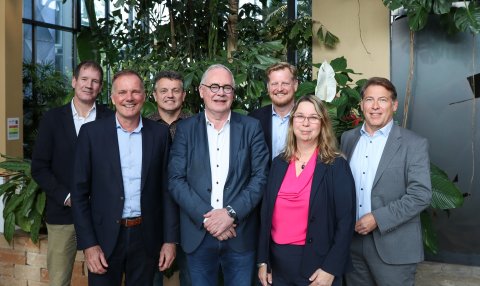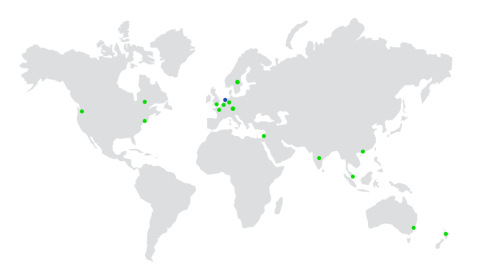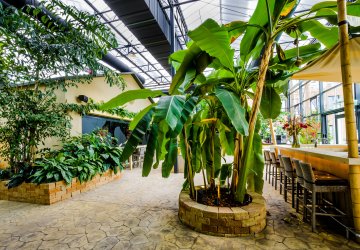
There is a great deal of talk around the important role that sustainability can play in your business. The COP26 summit held in Glasgow late last year was just one example of how vital it remains for governments, private companies and individuals to lower their carbon footprints.
What is less well known, however, is how sustainability can deliver a competitive advantage. For FM service providers, for example, sustainability is no longer seen as ‘a nice-to-have’ - it is essential. To stay ahead of their competitors, FM service providers are expected to consistently produce new sustainable services to support their customers with achieving their net-zero targets.
Another area where sustainability can help, is in the creation of a positive brand reputation - and the advantage that this creates is particularly noticeable in the area of recruitment. Increasingly, an organization’s ESG credentials are huge draws for job-seekers. Among younger employees, this is even more pronounced. According to a recent Deloitte survey, ‘Climate change/protecting the environment’ is the top concern for Gen-Z workers and remains listed in the top three worries for millennials. FM service providers generally have a hard time finding good personnel and as the desire to work for a sustainability-focused company increases, this could help with retaining talent.
But talk of ‘concerns’ can immediately lead recruiters and FM service providers into negative territory. This mindset needs to undergo a drastic shift. Sustainability is about much more than simply preventing an environmental apocalypse, and recruitment shouldn’t be thought of in similarly pessimistic terms either. It’s time for the war on talent, with its connotations of conflict and someone ‘losing’, to end. Use sustainability to show your ‘Love for Talent’ instead.
How can you add value?
Using sustainability to reposition your organization in terms of a ‘Love for Talent,’ means re-thinking how you talk about attracting employees. Don’t frame your recruitment in terms of box-ticking and meeting set criteria - make it explicit that you are looking for workers that can truly add value - in all parts of the business, but particularly in terms of your ESG credentials.
Make the workplace somewhere that employees look forward to visiting. Gartner predicts that by 2026, 60% of large corporate firms will use Total Experience to transform their business models to achieve better customer and employee advocacy levels. Facility service providers can start planning now for how they will support client sustainability objectives such as improved comfort, health, and productivity within a facility Total Experience strategy. By engaging employees, encouraging them to add value and go beyond their minimum requirements, businesses can unlock new innovative approaches to their ESG goals.
Hyperautomation can also play a dual role in encouraging sustainability and demonstrating precisely how employees can add value to an organization. The concept of hyperautomation (or automation, generally) can leave workers worried about robots coming for their jobs. But hyperautomation still requires talented individuals and creative minds. Rather than leading to job losses, it can free up employees from working on manual tasks so they can focus on truly adding value. In the field of sustainability, this could mean aligning personal and corporate values in unforeseen ways.
Hyperautomation can also have hugely positive effects on a building’s sustainability in other ways. Inefficiencies can instantly be analyzed end-to-end, the relevant actions can be implemented according to connected algorithms, and constraints can be automatically processed. This enables buildings to avoid undetected increases in energy consumption, alongside other negative impacts relating to sustainability. Another example of the positive effects hyperautomation can have on your sustainability initiatives concerns the automatic scheduling of resources, which can, for example, reduce car mileage by up to 15%, resulting in a huge fall in carbon emissions as well as increased capacity.
In parallel with the implementation of hyperautomated processes, almost all (96%) businesses see their employees as having an important role to play in improving their overall sustainability credentials. Hiring and retaining top talent involves reciprocity. How can a business serve its employees, how can those same employees add value to the business, and how can they work together to meet sustainable goals?
Share the love
Embracing sustainability delivers significant company benefits that are sure to make potential employees stand up and take notice. In pursuing a ‘Love for Talent,’ businesses will need to make themselves as attractive as possible to new recruits - and sustainability is one way of doing so.
Sustainability is a great way of boosting your brand reputation. For example, the 2021 IWFM Sustainability Survey found that 80% of FM service providers had clients who were either preparing to set or had already set carbon reduction targets. Employees broadly share these aims.
Plus, sustainable operations are a great way of encouraging outside investment. Between 2016 and 2020, sustainability-themed investing grew by a staggering 605%. Sustainability can improve your brand and your bottom line - and they are both hugely powerful factors when attracting new talent.
Ambition is not the same as execution
For all the talk around sustainability, it’s important to recognize that words will not ensure a company meets its ESG goals - action will. Hyperautomation solutions like those developed by Planon make your environmental impact measurable, predictable, and even prescriptible. They prove how your organization is contributing to sustainability.
Don’t see your recruitment as a war. Use sustainability and your love for the planet to win the ‘Love for Talent’ instead.
Are you interested in learning more about the benefits sustainability can bring to your organization? Read this white paper, ‘10 Reasons Why FM Service Providers Should Adopt Sustainability’ to further explore how you can secure business growth and gain competitive advantage.





















